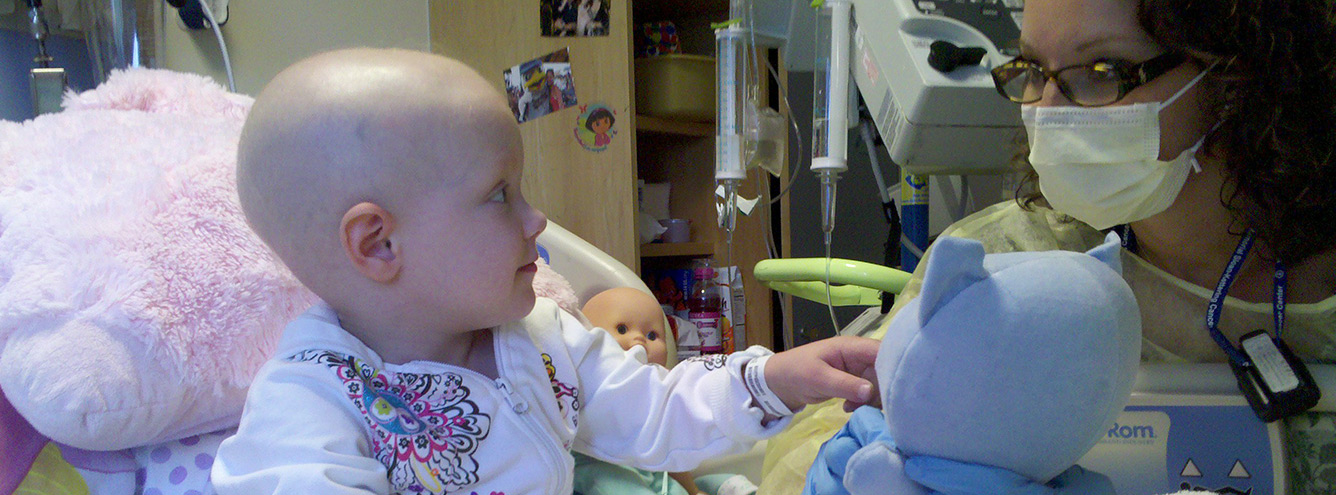Children endure many procedures during cancer diagnosis, treatment and follow up care.
These are an essential part of medical care, but can be extremely distressing for both the child and parent if not handled with sensitivity and understanding.
Procedures range from painless hearing tests to potentially very painful lumbar punctures, from quick eye drops to MRI scans of more than an hour.
Lack of planning and support can lead to loss of trust, poor cooperation, delayed development and long-lasting negative effects.
However, simple compassionate, honest preparation can help your child effectively cope with, and be actively involved in his care. The goal of child life is maximum time spent on preparation, minimum time spent on the actual procedure, and minimal distress for parent and child.
Many procedures will become frequent experiences throughout treatment. Developing a routine for each will help your child stay calm and cooperative, dramatically reducing stress for all of you.
Children take their cues from the words, actions and emotions of parents and other significant people. If you are calm, your child will also be calm.
When you have a coping plan, you and your child will be less apprehensive and feel a greater sense of control over the experience.
Medical Play for Procedure Preparation
Play helps young children process experiences, learn what will happen to them and master new skills that enable them to cope with procedures.
Distraction Play for Procedure Support
Distraction activities and toys reduce stress, increase cooperation and create fun for children undergoing procedures or coping with pain.
Comfort positions help your child feel more in control and give choices, creating a more positive experience and a routine for stressful events.
Specific Procedures
Click on the procedures below for specific suggestions of how to help your child complete it with minimal distress and maximum cooperation.
- Giving Eye Drops
- Needle Related Procedures
- Anaesthetuc Induction
- Surgery Preparation
- Enucleation Surgery
- Imaging Scans (MRI / CT / GFR / Bone Scan)
Kids Hygeine to Support Medical Care
Invisible microbes cause some of the most dangerous diseases in children, especially kids with cancer. Handwashing is the best defence, and a vital skill for all children to learn.
Less face touching helps reduce Infection risk, but this can be hard to achieve with young children. We hope these tips will help parents!
Child Life at One Rb World 2024 in Hawaii
At One Rb World, children, families and medical professionals have a rare opportunity to develop new procedure support and coping skills specifically tailored for the retinoblastoma experience.
Sessions during the 3-day program focus on psychological needs throughout the Rb journey and opportunities to integrate vital child life supports into patient care around the world..
A fun parallel program just for kids is fully staffed by child life professionals familiar with Rb care. Rb patients, young survivors, siblings, and children of adult survivors are welcome! Activities are tailored specifically to our young retinoblastoma community, mindful of the medical procedures and life experiences they may encounter.
National and global collaboration between retinoblastoma specialists, researchers, parents, survivors, and other advocates can dramatically improve the psychological experience and medical outcomes for each child with eye cancer, their family and the survivor decades beyond treatment. Connecting with others who have a similar experience is powerful encouragement for adults and children alike.
Would you like to join this global community sharing knowledge and experience, learning from one another, and exploring priority subjects together while children play, learn, and grow together for their own healing? We welcome you to the 7th One Rb World meeting, October 15-17 2024 in Honolulu, Hawaii. The meeting will be held just before the International Society of Paediatric Oncology World Congress which takes place 17-20 October, 2024 at the Honolulu Convention Centre.
One Rb World is community, conversation, and cooperation. An inclusive global collaboration for optimal lifelong care.



